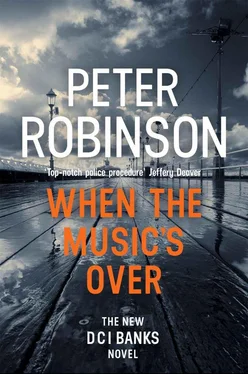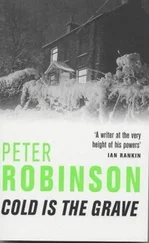‘Ah, well. Who needs the competition? No. I think Ted Hughes was a brilliant poet. As far as life skills went, they both sucked.’ She put her hand to her mouth. ‘Sorry, is that on the recorder?’
Winsome smiled. ‘Never mind. I don’t think anyone’s going to take issue with your opinion about Ted Hughes and Sylvia Plath.’
Linda clapped her hands. ‘Well thank heaven for that. More orange juice?’
Banks and Winsome exchanged glances. ‘No, I don’t think so,’ Banks said, standing up. He almost felt like telling her it had been a pleasure talking to her, but he remembered what they were there for. ‘I appreciate your cooperation,’ he said. ‘I’m sure we’ll want to talk to you again and ask some more questions, if that’s all right?’
‘You’ll come again?’
‘Yes.’
‘That’s good.’
‘And if you remember anything in the meantime, however unimportant it seems, call me. It might be a good idea to... never mind.’
‘No, go on. What? I’m intrigued.’
‘It’s a lot to ask,’ Banks said, ‘but sometimes with such old memories, it helps to work at them a bit, make an effort, perhaps write things down as they come, if they come. I mean, you’re a writer after all. But it could be painful.’
‘No,’ said Linda, giving him a curious, probing look. ‘A journal. A memoir. It’s a good idea. I’ll try. I promise.’
She stood up and saw them out. As they walked back up the garden path, Winsome turned to Banks and said, ‘Well, she certainly wasn’t what I was expecting. What do you think? I believed her.’
‘Me, too,’ said Banks. ‘I think we’re in with a chance on this one. I think we might just nail the bastard, especially if her memory gets jogged a bit by writing about it. We could do with finding out that other man’s identity, though. Let’s get back to the station and prep a few questions for Mr Caxton tomorrow, then I think we can head out early tonight. We’ve got a lot of homework to do before our trip to the seaside tomorrow.’
When the two detectives had gone, Linda Palmer breathed a deep sigh and refilled her glass with orange juice. It hadn’t been as terrible an ordeal as she had worried it would be, but she still felt shaken and wrung out. She had felt again while talking to them how terrified she had been all those years ago when she went to the police station in Leeds with her mother. It had taken a great deal of her inner reserves to appear as calm and relaxed about the whole thing as she had done today, shaking inside the whole time.
She wondered if she had seemed too detached to the detectives, too unemotional. Perhaps they hadn’t believed her. Weren’t victims supposed to behave differently? Cry, perhaps, or tremble with fear at their recollections? She worried that she may have been too flippant, too devil-may-care, laughed too often. She had wanted them to know that what had happened hadn’t ruined her life — that was important to her — though it had caused her a great deal of pain and suffering. She hoped she hadn’t gone too far in the direction of nonchalance to make them suspicious of her story. She hadn’t told them everything, of course, not all the myriad details that were etched somewhere in her memory and would, she knew, remain there for ever, along with the buried feelings that accompanied them. Though they weren’t easily accessible, the memories and feelings were still there, locked in the box she had put them in to retain her sanity in the months after the events of that summer’s day in Blackpool.
She drank some juice then felt in her jeans pocket for the packet of Marlboro Lights and disposable lighter. She didn’t smoke much, but she needed one now, despite the wonderful sweet-scented summer air. Go on, she told herself, pollute it. Make the birds cough on your second-hand smoke. Give the blue tits cancer.
Well, it was done now, set in motion, and things would be what they would be. Her life would never be the same, whatever the outcome. She wondered about the other women — she couldn’t bring herself to think of them as victims, though no doubt they were — and what they had gone through, what they remembered, what they were like now, how their lives had turned out. Perhaps it would have to be enough simply to know that they existed out there somewhere. There would be no collusion, of course. There would be no girly sessions in the pub. So what did he do to you, then, love? Nasty. You know he did exactly the same thing to me, and it hurt like hell. Was it your first time, too? The media would keep identities strictly secret, though how they could do that in these days of phone-hacking and a self-righteously obtrusive press she had no idea.
She didn’t even think she would mind all that much if people did know what she had been through, that she was one of the complainants against Danny Caxton. What if they did find out? What was the worst that could happen? The whole country would know that she, Linda Palmer, award-winning poet, was a victim of rape. Maybe it wasn’t such a bad idea. At least she had a certain standing in the community, a respected voice, unlike those poor girls who were groomed in the inner-city areas and used as sex objects. Nobody listened to them; they were simply written off as drugged-up slags and sluts who deserved what they got.
Linda closed her eyes, listened to the water and felt the shadows of the leaves dancing on her eyelids. The river was a constant presence in her life, it seemed. She drew in a lungful of smoke and leaned back in her chair, which wobbled as she did so, stretching out her legs and opening her eyes again. Persy lay where she had settled, sleeping in the sun. Soon she would have to move, as her patch would fall into shadow. The kingfisher had appeared on his branch, still and watchful. As usual, when she saw him fly in the late sun, she thought of Gerard Manley Hopkins’ poem: ‘As Kingfishers Catch Fire’.
As Linda exhaled the smoke, she saw it in her mind as if it were the smoke coming from the funnel of a steam train. She could almost hear the rhythm, wheels clacking over the joins in the track, feel the gentle swaying of the carriage and creaking of old woodwork, the rattling of the doors. It was the summer of 1967, and they were going on their annual holiday. Two glorious weeks in Blackpool. Linda, her mum and dad, and for the first time her best friend Melanie, along with her mum and dad, too.
But was it a steam train that year? Hadn’t they stopped running by then? When did the diesels take over? Memory. Memory. She was sure it was a steam train, and they had a compartment to themselves, all six of them. She could remember seeing the smoke drift by the partially open window, remember its acrid smell. She could see the dark engine ahead when it turned a long curve, chugging and puffing along, carrying them towards...
Linda sat up and stubbed out her cigarette, startled by the power of her memory. She hadn’t let herself remember that holiday for many years, but talking about it to the detectives today, thinking about it after she had read the news item about the latest celebrity jailed for abusing girls years ago, then thinking about it again after her father’s death, had brought it back to the front of her mind from the dark box to which she had consigned it. Whether she wanted it to or not, the box was opening, and perhaps, just perhaps, she was strong enough now to face its contents. She thought about what Banks had said about writing things down. Writing was her business, after all. Perhaps it was time.
She had kept a diary back then, she remembered. Every year her Aunt Barbara bought her a Letts Schoolgirl Diary for Christmas. It had a thin pencil that slipped down the spine, a page for each week and all sorts of information about world capitals, flags, holidays, time zones and units of currency. There wasn’t a lot of room for writing, though it more than sufficed for most days, and she had made her carefully concise entries scrupulously every day, no matter whether or not she did anything interesting. The diaries were all gone now, of course, dumped in one of the many clear-outs she had experienced over the years. What would she have written on the nineteenth of August, 1967? she wondered. ‘Got raped. Not very nice.’ Oh stop being such a wag, Linda, she told herself. Get on with it.
Читать дальше












